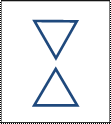
| Home | Our Hope | |
| Bible Study |

|
December 6, 2009 |
| Lineage of David | ||
There are a couple places in this lesson where it will be valuable to understand the significance of certain numbers in God's world. Therefore the following background is provided.
Many numbers found in the Bible have meanings in addition to their numeric values. Three numbers in particular appear again and again in the Bible.1
| 3 | The number of God, of divine perfection. This number comes from the three that make up the Godhead, the Father, the Son, and the Holy Spirit. |
| 6 | The number of Man. |
| 7 | The number of perfection / completion. This number appears all over the Bible and especially in the Book of Revelation. |
But 6 can also be thought of in another way. While God is a 3, there are others. The Jewish Temple was also a 3, consisting of the outer court, inner court and the Holy of Holies. The Spirit of God resided in the Holy of Holies.
This brings us to another 3, man. Man consists of three parts body, mind, and spirit and the Holy Spirit comes to reside in us. The strong parallel to the Jewish Temple is evident. Was it Paul who said, "Do you not know you are the temple of God?"


If God is symbolized as the triangle at the top "looking down" and man is symbolized as the triangle at the bottom "looking up", when we raise the man triangle to overlap (usually shown interwoven), we get this combination, which seems to say 6 = 3 + 3 means "the destiny of man is to be with God"
As we read through the Bible we should be aware, when we see these numbers come up, that there may be a deeper meaning. There is a case in the NIV where I believe the NIV authors missed something important in this way. This is from Matthew 13, NIV first then Aramaic NT, though almost all other translations say "three" as the Aramaic NT does.
33He told them still another parable: "The kingdom of heaven is like yeast that a woman took and mixed into a large amount of flour until it worked all through the dough."
33He told them another parable: "The Kingdom of Heaven is likened to yeast which a woman took and hid in three measures of meal until all of it had fermented."
Many people have had trouble with this verse because, in most cases, Jesus uses yeast in a negative way, as in "yeast of the Pharisees". But the real question is, why didn't Jesus say 2 measures, or 4 measures, or just "a large amount" as the NIV has made it? I believe Jesus intentionally used 3 to indicate that he was talking about man. So the message is "When the Kingdom of Heaven gets into man (or a man), in time it changes him completely"
This discussion of genealogies begins with Ruth and Boaz from Ruth 4.
13So Boaz took Ruth and she became his wife. Then he went to her, and the LORD enabled her to conceive, and she gave birth to a son. 14The women said to Naomi: "Praise be to the LORD, who this day has not left you without a kinsman-redeemer. May he become famous throughout Israel! 15He will renew your life and sustain you in your old age. For your daughter-in-law, who loves you and who is better to you than seven sons, has given him birth."
"No amount of sons, not even the "perfect number" of seven, can replace the love and honor that Ruth had given her mother-in-law" - NIV Standard Lesson Commentary
16Then Naomi took the child, laid him in her lap and cared for him. 17The women living there said, "Naomi has a son." And they named him Obed. He was the father of Jesse, the father of David.
Now we take a look at Mathew's genealogy of Jesus as given in Matthew 1.
1A record of the genealogy of Jesus Christ the son of David, the son of Abraham:
| Abraham to David2 | David to Captivity | Release to Christ |
| Abraham | David (Uriah's wife - Bathsheba) | Jeconiah |
| Isaac | Solomon | Shealtiel |
| Jacob | Rehoboam | Zerubbabel |
| Judah (Tamar) | Abijah | Abiud |
| Perez | Asa | Eliakim |
| Hezron | Jehoshaphat | Azor |
| Ram | Joram | Zadok |
| Amminadab | Uzziah | Achim |
| Nashon | Jotham | Eliud |
| Salmon (Rahab) | Ahaz | Eleazar |
| Boaz (Ruth) | Hezekiah | Matthan |
| Obed | Manasseh | Jacob |
| Jesse | Amon | Joseph (Mary) |
| David | Josiah | Jesus Christ |
Matthew's account is intended to portray a variety of meanings. First he intends to show that Jesus is an heir to the throne of David, as prophecy had said he would be, and that He was therefore also the fulfillment of the promise to Abraham. But Matthew also appears to be telling us something else.
17Thus there were fourteen generations in all from Abraham to David, fourteen from David to the exile to Babylon, and fourteen from the exile to the Christ.
By grouping the genealogy into 3 groups of 14 names, it appears he is providing evidence that Jesus is God. Also 14 is the gematria value of the name of David. However, Mathew achieves the grouping by dropping the names of Ahaziah, Joash, and Amaziah, and by duplicating the name of David, both in the second column. I've seen no good explanation of this.
There are other places in the Bible where individuals are dropped from genealogies and abridgements like this don't seem to be uncommon. We see a similar abridgement in Matthew 1:1 above, where David is accounted as the son of Abraham and Jesus as the son of David. Plainly they were not sons in the sense of immediate family members.
Matthew's account is also odd in that it sometimes mentions the mother's name. Israel was a very paternalistic society, as were most at the time. Genealogies were male based, as were royal lineage and inheritance. Some think that this may be a woman's accounting of the genealogy. It is also worth noting that 4 of the women were probably Gentiles. Matthew may be intending to show that Gentiles contributed to the lineage of Jesus.
Now we jump over to Luke's account of the genealogy of Jesus in Luke 3:23. Luke presents this account in the reverse order from Matthew's account, i.e. starting from Jesus but it is re-ordered below for comparison with Matthew's account above.
| Abraham | David | Eliezer | Josech | Matthat |
| Isaac | Nathan | Joshua | Semein | Heli |
| Jacob | Mattatha | Er | Mattathias | Joseph |
| Judah | Menna | Elmadam | Maath | Jesus |
| Perez | Melea | Cosam | Naggai | |
| Hezron | Eliakim | Addi | Esli | |
| Ram | Jonam | Melki | Nahum | |
| Amminadab | Joseph | Neri | Amos | |
| Nashon | Judah | Shealtiel | Mattathias | |
| Salmon | Simeon | Zerubbabel | Joseph | |
| Boaz | Levi | Rhesa | Jannai | |
| Obed | Matthat | Joanan | Melki | |
| Jesse | Jorim | Joda | Levi |
You'll note right away that this genealogy follows a completely different path, a non-royal path since it travels from David to Nathan and not Solomon.
"The Jerusalem Talmud indicates that Mary was the daughter of Heli (Haggigah, Book 77, 4). Joseph was the son-in-law of Heli. Luke could rightfully call Joseph the "son of Heli" because this was in compliance with use of the word "son" at that time. Moreover, designating a son-in-law as a son had scriptural precedent. Thus, Joseph was the son of Jacob, and the son-in-law of Heli."3
Because of this, some scholars assert that this is Jesus' genealogy through Mary's side but taken through Joseph because he was the "father" of Jesus, and genealogies were always paternal. Luke may be hinting at this in Luke 3.
23[…] He [Jesus] was the son, so it was thought, of Joseph […]
Other scholars have other beliefs about this. Unlike Matthew's account, it isn't entirely clear what Luke is trying to accomplish with this genealogy. The placement in the text is immediately after Jesus is baptized and a voice comes from heaven saying "You are my Son, whom I love; with you I am well pleased." Luke's account traces Jesus' genealogy back to Adam and then God4. So it seems that Luke is establishing that Jesus is the son of Adam and therefore God - but aren't we all.
Genealogies were very important in Israel. Their birthright to territory in Israel depended on that lineage. If they could establish their lineage, they could even reclaim land that they had sold or abandoned.
In Matthew 22:42, Jesus uses lineage in a question that he poses to the Pharisees, when he asks "What do you think about the Christ? Whose son is he?" The Pharisees respond by saying, "The son of David". Some prophecies about Jesus were better understood by the Pharisees than others. Jesus then goes on to show that David referred to the Messiah as his Lord. He was showing them that the Messiah would be God. Even today, Jewish views about the Messiah reject the notion that he is God.5
1 http://www.biblestudy.org/bibleref/meaning-of-numbers-in-bible/3.html
2 http://www.lifeofchrist.com/life/genealogy/matthew.asp
3 http://www.lifeofchrist.com/life/genealogy/joseph.asp
4 Not shown in the table above. The table begins with Abraham to match Matthew's account